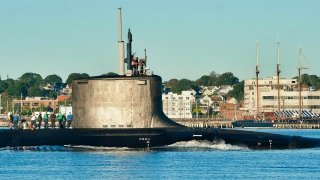$4,300,000,000: Is the Navy's Virginia-Class Submarine Worth the Cost?
The Biden administration's decision to cut one of two planned Virginia-class fast attack submarines from the upcoming budget has sparked criticism from both Republicans and Democrats. The $4.3 billion submarine is seen as crucial for U.S. naval preparedness, especially in countering China's missile advantage in the Indo-Pacific.
Summary and Key Points: The Biden administration's decision to cut one of two planned Virginia-class fast attack submarines from the upcoming budget has sparked criticism from both Republicans and Democrats. The $4.3 billion submarine is seen as crucial for U.S. naval preparedness, especially in countering China's missile advantage in the Indo-Pacific.

-The Virginia-class submarine features the Virginia Payload Module, enhancing missile capacity to address the "missile gap" with China. Critics argue that reducing submarine spending undermines U.S. defense capabilities and affects jobs in states with submarine-related industries.
-The debate continues on whether the cost-cutting measure is strategically sound or detrimental to national security.
Biden's Budget Cut: Will Fewer Virginia-Class Submarines Leave the U.S. Vulnerable?
The Biden administration has decided to cut one of two planned Virginia-class fast attack submarines for the upcoming budget, inciting criticism from both Republicans and Democrats. Despite the submarine’s hefty price tag, some proponents are arguing that the Virginia’s cost is worthwhile. The debate is far from settled, however.
At issue: is the submarine's $4,300,000,000 cost really worth it?
Virginia-Class Submarine: Worth the cost?
The decision to cut a Virginia-class submarine from the upcoming budget has led to claims that the U.S. Navy is not properly preparing itself for a prospective standoff with China.
vMeanwhile, domestic considerations are leading to criticism over the cancellation; states where the submarines are built depend on the construction of the submarine for jobs, and naturally, representatives from those states are none too pleased to see the planned submarine (and the associated jobs) cut.
“Democrats from states that build Navy subs are already vowing to fight the Biden administration’s decision to break with traditional and halve purchases of the Virginia-class attack sub in Pentagon spending plans unveiled,” Politico reported.
Representative Joe Courtney, a Democrat from Connecticut—home to submarine-related industry and infrastructure in Groton and New London—who chairs the House Armed Services Seapower and Projection Forces Subcommittee, has been a proponent for increasing submarine spending. Naturally, Courtney was displeased to see the Biden administration reduce submarine spending.
“To me, this is going in the opposite direction of where the Navy, Joe Biden and the Congress has been going consistently, towards recognizing we need a bigger fleet,” Courtney said.
Preparing for China
Regardless of domestic political-economic considerations, the Virginia is viewed as a vital part of U.S. naval preparedness in the Indo-Pacific. The Virginia is particularly important because the submarine was designed to help mitigate China’s advantage over the United States with respect to missile quantity, or the “missile gap,” thanks to an innovative component known as the Virginia Payload Module (VPM), which allows the Virginia to carry more missiles than its predecessors.
The reason such emphasis is being placed on U.S. submarine missile payload capacity is because of the missile gap, which occurred while the United States was a signatory to the Intermediate-Range Nuclear Forces Treaty, or INF, which banned ground-based nuclear and conventional missiles with a range of 310-3,410 miles. President Ronald Reagan entered the INF alongside Soviet leader Mikhail Gorbachev, in what was hailed as a peace-building victory.

President Donald Trump withdrew the United States from the INF, however, when he recognized that Russia was violating the treaty and China, which had not joined the INF, was building up a significant advantage in the Indo-Pacific with respect to intermediate-range missiles.
The Virginia was designed specifically to address the missile gap—which is why some pundits are concerned over President Joe Biden’s decision to cancel a forthcoming Virginia, because the U.S. missile deficiency will not be addressed.
About the Author: Harrison Kass
Harrison Kass is a defense and national security writer with over 1,000 total pieces on issues involving global affairs. An attorney, pilot, guitarist, and minor pro hockey player, Harrison joined the US Air Force as a Pilot Trainee but was medically discharged. Harrison holds a BA from Lake Forest College, a JD from the University of Oregon, and an MA from New York University. Harrison listens to Dokken.
All images are Creative Commons.


